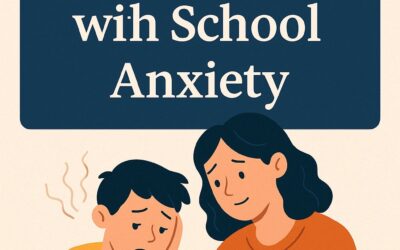College is a time of opportunity, growth, and independence. However, for students with social anxiety, it can feel like an uphill battle. Social anxiety—a persistent fear of being judged or embarrassed—can impact every aspect of college life, from academics to relationships. Left unaddressed, it may lead to missed opportunities and increased emotional stress.
The good news? Social anxiety is treatable. With practical strategies, a supportive environment, and the right resources, students can thrive in college and beyond.
What is Social Anxiety?
Social anxiety is more than nervousness about meeting new people or speaking in public. It’s a diagnosable condition characterized by intense fear of social situations, driven by worries about negative judgment or rejection. For students, this can make activities like participating in class or attending group projects feel overwhelming.
Common Symptoms of Social Anxiety
Social anxiety manifests in a range of physical, cognitive, and behavioral symptoms:
- Physical symptoms: Sweating, trembling, nausea, rapid heartbeat, or even panic attacks.
- Cognitive symptoms: Persistent worry about social interactions, overthinking past situations, and fearing judgment.
- Behavioral symptoms: Avoiding group activities, hesitating to seek help from professors, and procrastinating on assignments involving social interaction.
The intensity and combination of symptoms vary by individual, but the impact can be profound on daily life.
Social Anxiety vs. Shyness
While shyness and social anxiety share similarities, they differ significantly in their effects on daily functioning:
- Shyness: A personality trait where individuals feel reserved or hesitant but can adapt over time. Shyness typically doesn’t interfere significantly with life.
- Social Anxiety Disorder: A persistent, debilitating fear that causes avoidance behaviors and significant distress in academic, personal, and social situations.
For instance:
- A shy student may feel nervous before a class presentation but complete it successfully.
- A student with social anxiety might lose sleep weeks beforehand, experience physical symptoms during the presentation, and replay perceived mistakes for days after.
The Impact of Social Anxiety on College Students
Social anxiety affects three critical areas of a student’s life: academics, emotional well-being, and opportunities for personal growth.
Academic Challenges
- Reluctance to ask questions in class or during office hours.
- Avoidance of courses requiring presentations or group projects.
- Procrastination on tasks involving social interaction, leading to lower grades.
Emotional and Physical Strain
- Persistent stress, which can lead to burnout.
- Isolation and loneliness from avoiding social events.
- Physical symptoms like headaches, stomachaches, and fatigue caused by chronic anxiety.
Missed Opportunities
- Skipping networking events, internships, or career fairs due to fear of social interactions.
- Avoiding clubs or organizations that could foster friendships and skill-building.
- Declining leadership roles or career-advancing opportunities.
Understanding these challenges is the first step toward overcoming them.
Read about Individual Depression Counseling Here
Feeling overwhelmed? You don’t have to face social anxiety alone. Schedule a consultation today and take the first step toward gaining confidence and control in your college experience.
7 Strategies to Manage Social Anxiety in College
These practical strategies can help students reduce anxiety, build confidence, and fully engage in the college experience.
1. Confront Avoidance Behaviors
Avoidance might feel like a relief in the moment, but it reinforces anxiety over time. Facing fears gradually helps students build resilience.
- Start small. Attend low-pressure events, like study groups or campus tours, before larger gatherings.
- Use exposure therapy techniques, such as practicing introductions or brief conversations with peers.
- Celebrate every win, no matter how small. Each step forward builds momentum.
2. Communicate with Professors
Professors want their students to succeed but may not know about their struggles unless students share them.
- Use email if face-to-face conversations feel intimidating.
- Request accommodations, such as smaller audience presentations or alternative assignments, where possible.
- Develop a rapport early to create a supportive academic environment.
3. Practice Relaxation and Mindfulness Techniques
Relaxation methods can help manage physical and emotional symptoms of anxiety.
- Deep breathing exercises: Inhale for four counts, hold for four counts, and exhale for four counts.
- Mindfulness meditation: Spend 5–10 minutes a day practicing mindfulness to stay present and reduce overthinking.
- Progressive muscle relaxation: Focus on tensing and relaxing each muscle group to release tension.
4. Prepare for Social Interactions
Preparation reduces uncertainty, which is often a trigger for anxiety.
- Role-play conversations with a friend or counselor to build confidence.
- Prepare responses for common social situations, like asking a professor for help or introducing yourself in class.
- Use positive affirmations before interactions, such as, “I am capable, and I belong here.”
5. Build Meaningful Connections
Strong relationships are a cornerstone of college life. Building connections may feel daunting, but small steps can make it easier.
- Join clubs or organizations that match your interests. Shared hobbies provide an easy starting point for conversation.
- Attend events with a trusted friend for extra support.
- Set achievable goals, like greeting one new person each week, to gradually expand your comfort zone.
6. Develop Healthy Lifestyle Habits
Physical health and mental well-being are deeply connected. Simple lifestyle adjustments can reduce stress and increase energy.
- Exercise regularly. Even 20 minutes of walking can release endorphins that improve mood.
- Prioritize balanced meals and hydration. Avoid excessive caffeine, which can heighten anxiety.
- Stick to a consistent sleep schedule to improve focus and emotional resilience.
7. Seek Professional Support
Campus counseling centers are valuable resources for students with social anxiety.
- Cognitive Behavioral Therapy (CBT): A proven method for challenging negative thoughts and developing coping strategies.
- Group Therapy: A supportive environment to connect with peers who understand similar struggles.
- Workshops: Many campuses offer programs on stress reduction, anxiety management, and mindfulness.
Seeking help is not a sign of weakness—it’s an empowering step toward growth.
Read About Individual Anxiety Counseling Here.
Frequently Asked Questions
Q: How can I tell if my nervousness is social anxiety?
While some nervousness is normal, social anxiety involves persistent fears and avoidance that disrupt daily life. If this sounds familiar, reaching out for professional help can provide clarity.
Q: Are there specific treatments for social anxiety?
Yes. Cognitive Behavioral Therapy (CBT) is highly effective, and medications like SSRIs may complement therapy. A counselor or healthcare provider can guide you toward the best approach.
Q: What should I do if social anxiety feels overwhelming?
Contact your campus counseling center or a trusted professional. You don’t have to face this challenge alone.
Why Managing Social Anxiety Matters
Addressing social anxiety is about more than reducing symptoms. It’s about unlocking potential. College is a time for growth, learning, and connection. By managing social anxiety, students can fully engage in these experiences and build the confidence needed for future success.
Final Thoughts
Social anxiety in college is challenging, but it’s not insurmountable. With practical strategies, support systems, and professional help, students can overcome fears, grow in confidence, and embrace the opportunities college life offers.
You are not alone in this journey. Each small step you take is a victory, moving you closer to the thriving life you deserve.
Links and Resources
- Social Anxiety – NHS
https://www.nhs.uk/mental-health/conditions/social-anxiety/ - Social Anxiety – Cleveland Clinic
https://my.clevelandclinic.org/health/diseases/22709-social-anxiety - Social Anxiety Disorder – HealthDirect
https://www.healthdirect.gov.au/social-anxiety-disorder - Social Anxiety Disorder – Yale Medicine
https://www.yalemedicine.org/conditions/social-anxiety-disorder - Social Anxiety Disorder: Treatments and Tips – Harvard Health
https://www.health.harvard.edu/mind-and-mood/social-anxiety-disorder-treatments-and-tips-for-managing-this-challenging-condition - Social Anxiety Disorder: Symptoms, Causes, and Treatments – Medical News Today
https://www.medicalnewstoday.com/articles/176891





